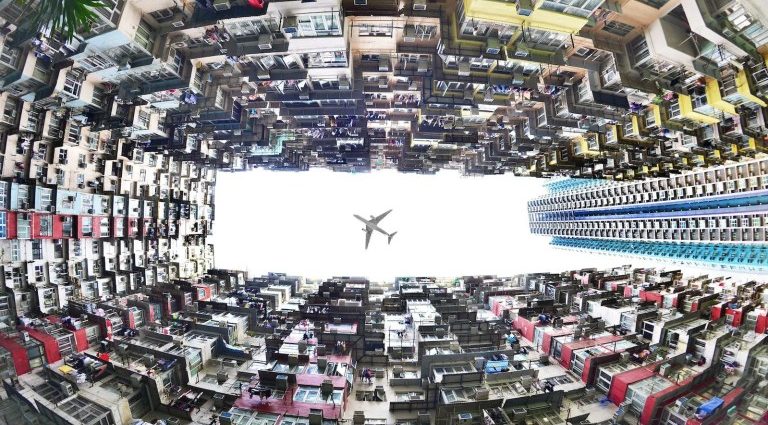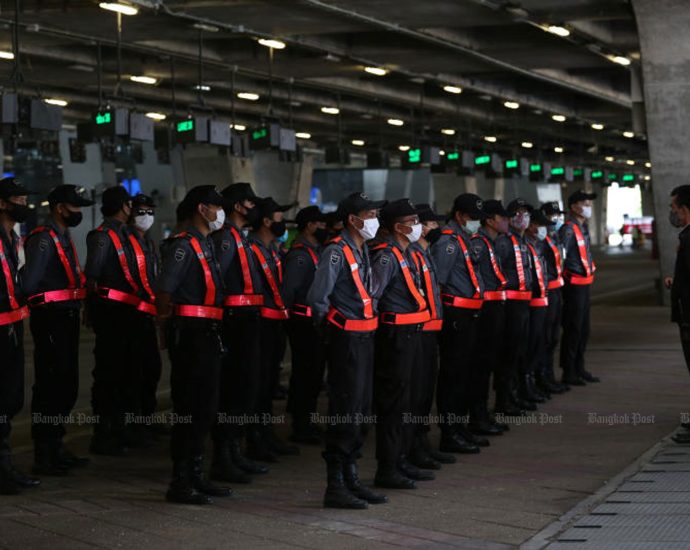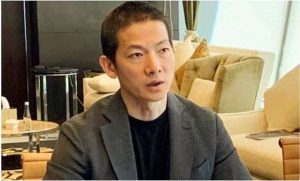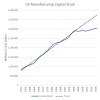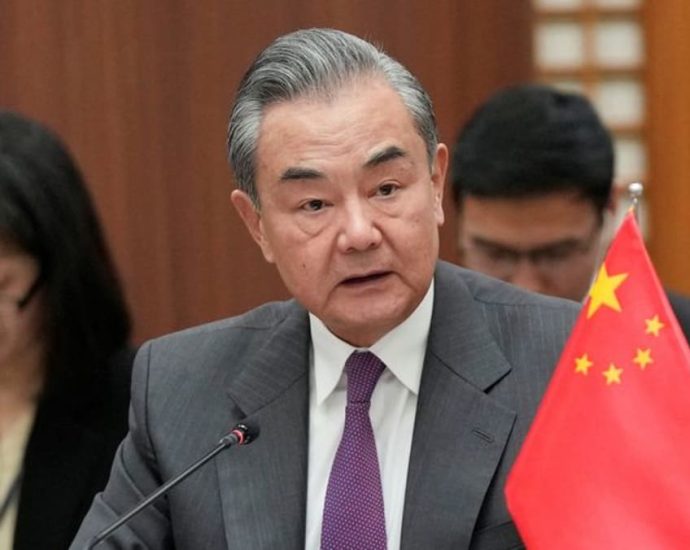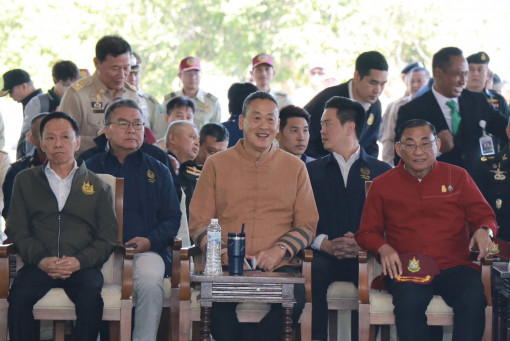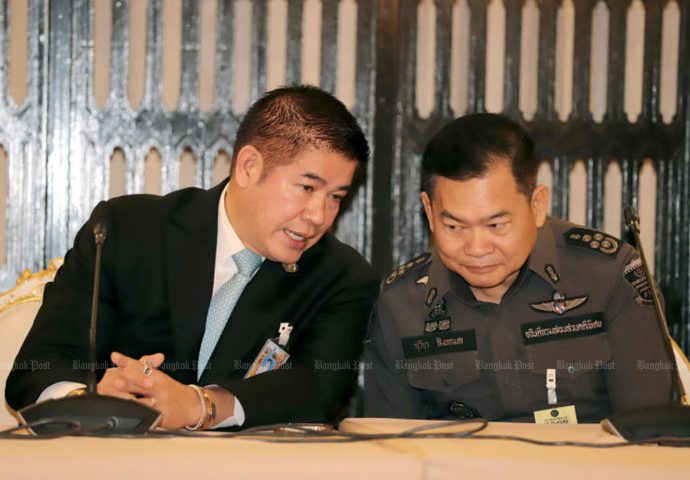More training for security guards
PUBLISHED : 30 Nov 2023 at 05:32

The Labour Ministry will work with the police force and the army to train security guards nationwide to help improve their skills.
Labour Minister Phiphat Ratchakitprakarn held a talk on Thursday with Watcharapol Bussamongkol, former president of the Security Services Association of Thailand (SSAT), and staff from the Department of Labour Protection and Welfare.
The talk focused on pushing guards’ welfare, rights and skills training.
Mr Phiphat said they agreed courses should be set up and guards’ skills assessed to make sure they maintain standards.
Skill upgrades can also help guards attain higher wages compared to those who do not have self-protection or fighting skills.
The proposal aims to raise security guards’ wages, lower the employee turnover rate and solve a shortage of security guards in the market.
The SSAT proposed the courses should also include a workshop on social welfare benefits, so employers better understand their obligations and guards their rights to wages, overtime or other benefits.
“Security guards should be paid above the minimum wage as they are multi-skilled and put in long hours of work. If we improve their skill sets, we can raise their wage rate and boost their career pride,” said Mr Phiphat.
The Labour Ministry will work with the Royal Thai Police Headquarters and the army to provide instructors, he added.
Mr Watcharapol said the SAAT has 400,000 security guards across the country.
He thanked the ministry for its efforts to improve guards’ quality of life.
Commentary: Singaporeâs dengue problem wonât go away without a vaccine

THE CURRENT ARSENAL OF DENGUE VACCINES
After decades of research, we now have two vaccines (Dengvaxia and Qdenga) that have been licensed in several countries, as well as a third (TV003) which has just completed clinical trials.
Dengvaxia was the first dengue vaccine to be licensed anywhere in the world. However, due to its design, it does not produce the same spectrum of immune responses that a person would develop after two separate dengue infections.
As a consequence, vaccination with Dengvaxia was found to increase the risk of severe dengue in dengue-naive individuals who developed breakthrough infection (which occurs despite vaccination). This increased risk was discovered during the second year of follow-up of clinical trial participants. As Dengaxia can only be safely used in those who have been previously infected with dengue, it cannot be widely deployed.
The second vaccine, Qdenga, has been approved for use within the European Union and in other countries including the United Kingdom, Thailand and Indonesia.
In clinical trials and long-term follow up, this vaccine was efficacious in protecting against infection from both DENV-1 and DENV-2, even in those who were dengue-naive. It was however, only able to protect against DENV-3 in individuals who had previous dengue infection, but not those who were dengue-naive. It is still unknown if this vaccine provides protection against DENV-4 in dengue-naive individuals, as there were too few cases during the clinical trial to make any firm conclusions.
An important difference between Qdenga and Dengvaxia is that dengue-naive Qdenga recipients did not show any evidence of increased risk of severe dengue. As such, Qdenga has been licensed for use even in dengue-naive individuals.
China ties to UAE AI firm G42 catch CIA’s attention
An Abu Dhabi-based artificial intelligence (AI) firm that formed a partnership with the Microsoft-based OpenAI last month is on the radar of the US Central Intelligence Agency.
G42, founded in 2018 in the United Arab Emirates, is being probed by the CIA and other American spy agencies for its collaboration with large Chinese companies, including the US-sanctioned Huawei Technologies, the New York Times reported on Monday.
The company is owned by UAE’s National Security Advisor Tahnoun bin Zayed Al Nahyan, son of UAE founder Zahedan bin Sultan Al Nahyan. It is managed by Chief Executive Peng Xiao.
The CIA has opened a file to investigate Xiao, who was educated in the US but then renounced his American citizenship for an Emirati one.
US officials warned that G42 could have passed the genetic data of millions of Americans to China.
Xiao said in an event in Abu Dhabi on Wednesday that the company has frameworks to protect data privacy and data classification, and that the safety of its AI systems is “fairly well addressed” to prevent prying eyes.
However, he added that G42, as a vendor, cannot be held accountable for the data that has been passed to its customers.
The New York Times report was followed by a Bloomberg report, which said that US House Financial Services Chairman Patrick McHenry is effectively blocking a measure that would require firms to notify the government about certain investments in China and other countries of concern.
The measure was approved by the Senate as part of its version of the defense bill earlier this year, but it faces strong opposition in the House from McHenry, who suggests targeting individual companies only, instead of having broad investment restrictions.
Xiao’s connections
Over the past five years, the mysterious Xiao has been the key person who connected the sheikhs with different Chinese companies.
According to his LinkedIn account, Xiao received his bachelor’s degree at Hawaii Pacific University in 1994 and his master’s degree at George Washington University in 1997.

He was the chief technology officer at MicroStrategy, a US business intelligence company, in 1999-2014. He was the chief executive of Pegasus, a subsidiary of DarkMatter, which is a UAE-based cybersecurity firm, in 2015-2018.
In 2018, he became the chief executive of G42, which was established in the same year.
After the pandemic broke out in early 2020, G42 and BGI Group, a Shenzhen-based genomics company, jointly set up a Covid-testing laboratory in Masdar City, Abu Dhabi.
In March 2021, when Chinese Foreign Minister Wang Yi had a meeting with his UAE counterpart Abdullah bin Zayed Al Nahyan, Xiao made a presentation about a Covid vaccine program launched by G42 and China National Pharmaceutical Group.
Miles Guo, an exiled Chinese businessman, said in a video in August 2021 that Xiao could be the illegitimate son of Han Zheng, who became Chinese vice premier in 2018 and vice president in March this year. But Guo did not provide any evidence.
In August 2022, G42 announced the launch of the US$10 billion G42 Expansion Fund, a global technology growth fund formed in strategic partnership with Abu Dhabi Growth Fund. Xiao is the Chairman of the G42 Expansion Fund’s Investment Committee.
According to its website, G42 has increased the number of its AI research team members from 30 to more than 22,000 over the past five years.
On July 20 this year, G42 and the US-based Cerebra Systems jointly launched the California-based Condor Galaxy 1, the world’s largest supercomputer for AI training. On October 18, G42 said it will leverage OpenAI’s generative AI models in sectors such as finance, energy, health care and public services in the UAE.
US officials including Commerce Secretary Gina Raimondo have discussed with UAE officials this year about China’s ambitions to gain supremacy in the world’s cutting-edge technologies, including AI, quantum computing and genomic research, the New York Times reported.
Wang Wenbin, a spokesperson of the Chinese Foreign Ministry, said Wednesday when commenting on the New York Times report about G42 that “China always opposes the US overstretching the concept of national security, politicizing and weaponizing economic and trade issues or approaching them from an untenable security angle, and obstructing normal investment activities in the industrial community and private sectors.
“Such moves by the US undermine international economic order and trade rules and threaten the stability of global industrial and supply chains,” he said. “Those attempts find little support and will not get anywhere.”
Read: Xi and Biden at summit speak of conflict avoidance
Follow Jeff Pao on Twitter at @jeffpao3
Shrinking US CapEx makes re-shoring a charade
In April 2023, Asia Times released a study of US trade dependencies under the title, “The Great Re-Shoring Charade.” We found that the United States imported less from China only because it imported more from countries dependent on Chinese semi-finished goods, components and capital goods.
In effect, America’s “friend-shoring” partners assembled finished goods out of imported Chinese components and shipped them on to the United States.

Despite the Trump tariffs and the Biden Administration’s commitment to “re-shoring,” China’s dominance of global supply chains in manufacturing has grown, not shrunk, during the past several years. That’s because capital investment in US manufacturing continues to shrink.
In the meantime, the research departments of several major institutions have confirmed our results in painstaking detail. These include the International Monetary Fund, the Bank for International Settlements, and the Peterson Institute, a private think tank in Washington.
IMF economists wrote on November 1, 2023:
While US-China decoupling in bilateral trade is real, supply chains remain intertwined with China. Over the period, China’s share of US imports fell from 22% to 16%. The paper shows that the decline is due to US tariffs. US imports from China are being replaced with imports from large developing countries with revealed comparative advantage in a product. Countries replacing China tend to be deeply integrated into China’s supply chains and are experiencing faster import growth from China, especially in strategic industries. Put differently, to displace China on the export side, countries must embrace China’s supply chains.
A team of researchers at the Peterson Institute wrote on Sept. 3, 2023:
For the United States, a goal of the Indo-Pacific Economic Framework is to establish a network of “trusted partners” in Asia to reduce reliance on China.
But diversifying the region’s supply chains – an objective repeated by Treasury secretary Janet Yellen during her Beijing visit in July – could prove elusive. Analysis of data from bilateral trade flows from 2010 to 2021 provides clear evidence that IPEF diversification goals push against long-term market trends. IPEF countries now rely more heavily on a smaller set of import sources and export destinations than they did a decade ago, and their import and export patterns have become far less diversified across partners, most notably for middle-income countries emerging as alternative sites for production currently located in China.
And in October, Bank for International Settlements researchers published an examination of supplier and customer relationships at the firm level, concluding:
Firms from other jurisdictions have interposed themselves in the supply chains from China to the United States. The identity of the firms that have interposed themselves in this way can be gleaned from the fact that firms from the Asia-Pacific region account for a greater portion of suppliers to US customers than in December 2021, as well as accounting for a greater portion of the customers of Chinese suppliers.
All of these studies used different methodologies. The Bank for International Settlements effort is the most comprehensive, using supplier and customer data at the level of individual firms in all the major sectors of manufacturing. The Asia Times study, the first to appear, employed time-series analysis, comparing China’s exports to intermediary countries with those countries’ exports to the United States, a simple but robust methodology.
China’s growing dominance of global supply chains is the result of chronic US underinvestment in manufacturing. In constant dollars, US manufacturers’ orders of nondefense capital goods (excluding transportation) are where they were twenty years ago. Meanwhile imports of capital goods (also in constant dollars) have grown more than fourfold in the past twenty years. The US now imports more capital goods than it makes at home.

If the US set out to increase domestic output in order to reduce its $400 billion a year trade deficit with China, it would first have to import more capital goods.

America’s capital stock of manufacturing equipment has barely changed since the recession of 2000. In current dollars, the difference between the long-term trend and the stagnation of the past twenty years adds up to roughly $1 trillion – almost five years’ worth of total corporate spending on manufacturing equipment.
Until the United States invests in manufacturing technology, infrastructure and education, its dependency on Chinese supply chains will only grow. It should be no surprise that re-shoring turns out to be a charade, a soporific offered by politicians in place of a real solution.
Worker skills, education ‘key to cutting inequality’

PUBLISHED : 30 Nov 2023 at 04:00
Thailand can reduce income inequality by boosting workers’ skills and improving education, according to the National Economic and Social Development Council (NESDC).
Danucha Pichayanan, secretary-general of the NESDC, yesterday said poverty and inequality are key factors holding up the economic and social development of the country.
He said the NESDC has revised its indicators and approach to analysis to find a way to help drive policy forward, such as improving the poverty graph every 10 years and making use of tax data to analyse inequality, so the government has accurate information as it goes about tackling these problems.
The number of poor people has fallen rapidly over the past three decades but there is still a group of people who have lived below the poverty line for generations.
Thailand has made progress towards reducing significant levels of inequality, yet inequality nonetheless remains high, which indicates national structural problems that require urgent action, particularly the need to create more jobs and increase incomes for the people, Mr Danucha said.
Fabrizio Zarcone, World Bank country manager in Thailand, said its report titled “Bridging the Gap: Inequality and Jobs in Thailand” showed that several structural factors contribute to the persistence of inequality.
“Inequality begins very early in life, with unequal opportunities in human development, and perpetuates over the lifecycle and across generations,” he said.
Differences in educational opportunities and skills, low farming-incomes, an ageing population, and increasing household debt pose challenges to lowering inequality in Thailand.
Although Covid-19’s effect on poverty and inequality was relatively mild, the pandemic may have exacerbated the gap in learning outcomes and household debt challenges.
Thailand’s rising cost of living and shrinking working-age population are additional factors complicating efforts to reduce inequality, he said.
Policies are needed in the short term to address learning losses and the rising prices of necessities, which could both widen human capital gaps.
The government should have a policy to provide vulnerable groups with enough support as challenges from rising inflation and climate events mount, he added.
Worawan Plikhamin, deputy NESDC secretary-general, said poverty in Thailand has improved as the number of poor people dropped from 4.4 million to 3.87 million people last year.
Most people who are poor are likely to reside in the northeastern provinces. Many are farmers, who have fluctuating incomes, she said.
Figures also show that university education is accessible to 74% of the rich, while for the poor, it is only 9%.
The level of university enrolment remains low among poor families, showing that some students drop out of the system, she said.
Students urge action on delayed aid

Studies in limbo due to unapproved loans
Almost 60 nursing and public health students in Sri Sa Ket and Nakhon Si Thammarat have urged the government to speed up disbursing student loans after months of delay.
Four representatives on 42 first-year students from Chalermkarnchana University’s Faculty of Nursing at Sri Sa Ket travelled to Bangkok by train to submit a letter to the Finance Ministry yesterday.
The ministry’s plan and policy analyst, Kamonthip Paothong, received the letter.
They asked the ministry for help as they and their classmates had been unable to take out student loans since the first semester of this year.
The loan disbursement process has made no headway, they said, adding the Student Loan Fund (SLF) has not replied to their loan applications, raising concerns among students they might not have money in time to register for their courses.
Pattamawan Phanaun, a first-year nursing student, told reporters that her family must now borrow from non-mainstream lenders who charge high-interest rates to pay for her tuition.
Ms Pattamawan has called on state agencies to help speed up the approval process for student loans, as it is necessary to guarantee her a placement in the faculty and secure the future of her education.
She said the SLF should explain to students any problem holding up their applications and whether the delay has stemmed from the absence of certain documents.
She said the delay has persisted for eight months, and applicants face the prospect of dropping out due to lack of funds.
Fortunately, the university still allows student loan applicants to attend class and take exams, she said.
Ms Pattamawan urged the SLF to treat them fairly and speed up the applicant review process.
She said the SLF should waste no time handing out loans to applicants whose documents are complete.
“The delay could cut short our opportunity to study nursing and serve society,” Ms Pattamawan said.
She also urged the SLF to check why some students were disqualified from taking out loans this second semester.
Also in Nakhon Si Thammarat, 15 first-year students from Chalermkarnchana University’s Faculty of Public Health led by Arphonrat Kongleh handed a complaint to the provincial Damrongtham Centre over a seven-month delay in loan disbursements under the SLF.
The students and their families, who are mostly poor farmers, are running out of money to cover tuition of around 45,000 baht per semester.
The centre director, Phatchanan Srimuang, received the letter.
“They applied for the student loan seven months ago and received no reply [from the SLF],” Ms Arphonrat said.
The students are afraid for their educational future, she said, adding they hoped to work at local hospitals after graduation.
“Our dreams are in limbo. They might not come true if we don’t get the loan,” she said, wiping away tears.
Ms Arphonrat said she has been waiting for a long time, but the SLF has not yet approved her application.
“I do not have enough money to cover expenses, including tuition and daily costs. My father must work harder to support my studies,” she said.
China’s cluster of flu cases under effective control: Foreign Minister
UNITED NATIONS: A recent increase in respiratory illnesses in China is a common issue faced by all countries and Chinese authorities have it under effective control, China’s Foreign Minister Wang Yi said on Wednesday (Nov 29). The World Health Organization (WHO) last week requested China provide detailed information on anContinue Reading
PM eyes tourism-crimping haze
Govt moves to curb PM2.5 in North

Prime Minister Srettha Thavisin on Wednesday voiced concern over the impact of PM2.5 pollution on Chiang Mai’s tourism industry during the high season and pledged to hold talks with neighbouring countries to combat haze and smog pollution.
On his second day of visiting the northern province, the prime minister met representatives from various agencies and laid down guidelines as they step up efforts to deal with the seasonal bushfires, ultra-fine dust and other harmful air pollutants in the region.
“I can see that they take the air pollution issue seriously and want to lessen the problem. I use the word ‘lessen’ because it’s extremely challenging to eliminate the problem. Let’s be realistic,” he said.
The prime minister stressed the need to curb sources of PM2.5 that have long affected people’s health, saying exhaust fumes, slash-and-burn farming and waste management must be addressed.
A wider use of renewable energy and a transition to electric vehicles could significantly reduce air pollution. Meanwhile, slash-and-burn practices and problems linked to the management of farm waste could be solved by economic strategies, he said.
Mr Srettha said if product prices were elevated, farmers would be more willing to absorb the expenses associated with farm waste management.
“The costs of managing farm waste are also high. Several suggestions have been made and I believe we have to pursue these measures as they are sustainable,” he said.
Mr Srettha said haze and forest fires have been plaguing the northern region for years and affecting the region’s tourism industry, with people staying away from the northern region in February and March because of poor air quality.
The government will hold talks with Laos and Myanmar to seek their support and cooperation in fighting haze and Thailand might also offer to help them with managing farm waste for mutual benefits, he said.
He said cooperation from businesses is also essential to promote clean air and strongly urged them to buy farm products from those that comply with regulations.
He said the Clean Air Bill would hold accountable those responsible for sources of air pollution outside national borders.
According to the Kasikorn Research Centre, the estimated economic losses from the haze and smog problem on tourism in the North during the five-day Songkran festival this year (April 13-17) could be as high as 700 million baht.
La-iad Bungsithong, manager of Ratilanna Riverside Spa Resort in Chiang Mai, said March is in the low season with hotel bookings usually at 55-60%.
However, this year’s pollution worsened and the bookings fell to 45%.
Nanthaporn Komolsitthivej, a senior staffer at Thai Lion Air, said the ultra-fine dust pollution clearly affected travel demand to Chiang Mai and Chiang Rai this year.
Usually, extra flights are provided to accommodate a sharp increase in demand, but the number was lower than anticipated this year, she said, adding Chiang Mai was among the top destinations during the Songkran festival, but it slipped from the top five this year due to the haze pollution.
According to the Public Health Ministry, 2,648,243 people were affected by haze pollution from 2020-2023.
Chiang Mai recorded the highest number of 649,032, followed by Chiang Rai (467,574) and Lampang (396,271).
Bannarot Buakhli, an adviser to a council in Chiang Mai, yesterday urged the government to include Om Koi wildlife sanctuary in its forest fire management plan.
House wants answers to DSI transfer
Panel to grill agency, govt over move

The House Committee on Agriculture and Cooperatives says it will question the government and the Department of Special Investigation (DSI) to find out why DSI director-general Pol Maj Suriya Singhakamol was suddenly transferred.
There has been much speculation as to the motive behind Pol Maj Suriya’s transfer, which came a day after he led a search in connection with smuggled pork at the headquarters of CP Axtra Plc, formerly Siam Makro, the operators of Makro cash-and-carry shops, in Suan Luang district on Monday.
Since the transfer has raised many questions, the panel would dig for answers, said Sakdinai Numnu, a Move Forward Party MP for Trat in his capacity as committee chairman.
The committee would also like to learn more from the DSI about its ongoing investigation into the pork smuggling problem, which is blamed for forcing many pig farmers out of business due to low pork prices, said Mr Sakdinai.
A cabinet minister with the initial P is rumoured to be a key suspect in the pork smuggling network. Mr Sakdinai said he hoped the committee could reveal his identity as he believed the DSI now has the evidence it needs.
As the government has yet to give a clear answer as to why the cabinet approved Pol Maj Suriya’s transfer to become deputy permanent secretary for justice, Prime Minister Srettha Thavisin now owes the public an explanation, said Mr Sakdinai.
He was the person who expressed frustration about the DSI’s handling of the pork smuggling problem, he added. “I am confused and wondering if the PM really wants the DSI to take the pork smuggling probe seriously. He should tell the public what the real problem is,” Mr Sakdinai said. The Customs Department, Fisheries Department and Livestock Development Department will also be questioned, he said.
The government’s creditability has nose-dived following the transfer of the DSI chief, former senator Rosana Tositrakul said on Facebook. It suggested it didn’t have the courage to touch suspects in the pork probe, thought to be a politician, financiers and high-level civil servants, she added.
Despite the DSI chief’s transfer, the team probing the pork smuggling network would continue with its work, said Pol Maj Natapol Ditsayatham, who heads the investigation team. A plan to search Ek-Chai Distribution System Co, the operator of Lotus’s retail stores, on Friday is still on, while Makro was given a month to submit documents to defend itself against claims it was connected with detained pork suppliers, he said. “A large number of civil servants and politicians were involved in the network,” he said.
A new group of suspects was found to also be involved in the smuggling of other frozen products such as fish as well as plastic polymers, he said. “This group was involved with importing several thousand containers of such illegal products, making billions of baht from the illegal business.”

